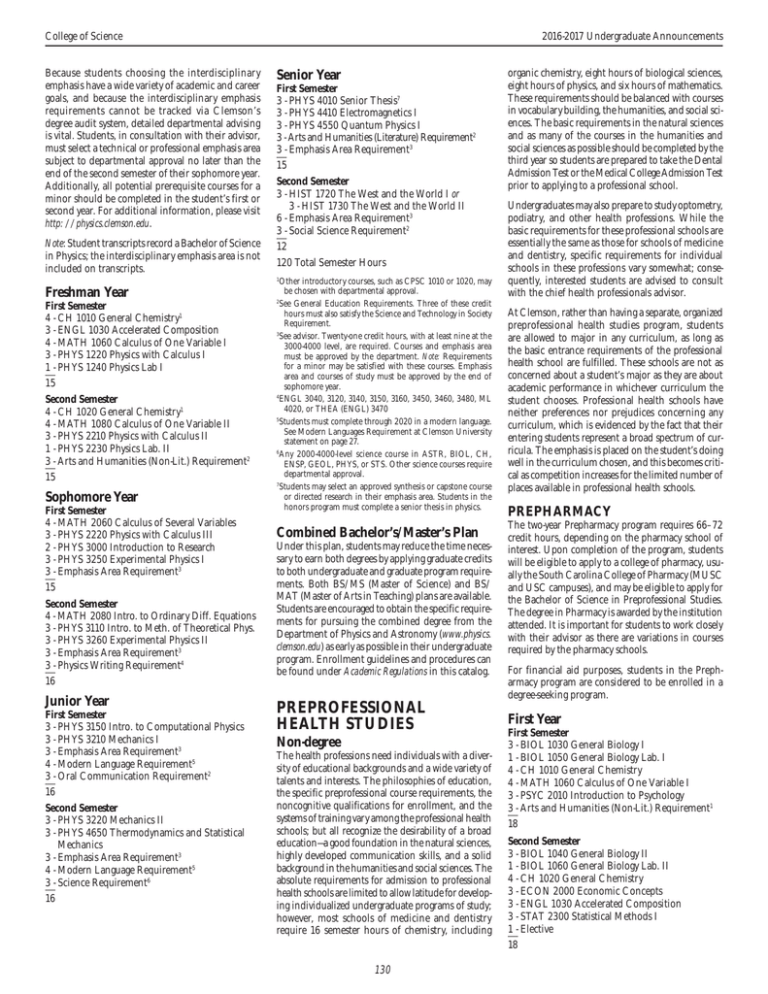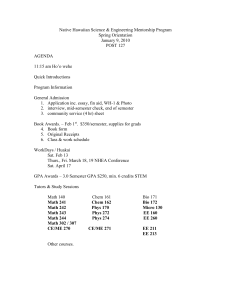preprofessional health studies
advertisement

College of Science Because students choosing the interdisciplinary emphasis have a wide variety of academic and career goals, and because the interdisciplinary emphasis requirements cannot be tracked via Clemson’s degree audit system, detailed departmental advising is vital. Students, in consultation with their advisor, must select a technical or professional emphasis area subject to departmental approval no later than the end of the second semester of their sophomore year. Additionally, all potential prerequisite courses for a minor should be completed in the student’s first or second year. For additional information, please visit http: //physics.clemson.edu. Note: Student transcripts record a Bachelor of Science in Physics; the interdisciplinary emphasis area is not included on transcripts. 2016-2017 Undergraduate Announcements Senior Year First Semester 3 - PHYS 4010 Senior Thesis7 3 - PHYS 4410 Electromagnetics I 3 - PHYS 4550 Quantum Physics I 3 - Arts and Humanities (Literature) Requirement2 3 - Emphasis Area Requirement3 15 Second Semester 3 - HIST 1720 The West and the World I or 3 - HIST 1730 The West and the World II 6 - Emphasis Area Requirement3 3 - Social Science Requirement2 12 120 Total Semester Hours Other introductory courses, such as CPSC 1010 or 1020, may be chosen with departmental approval. 2 See General Education Requirements. Three of these credit hours must also satisfy the Science and Technology in Society Requirement. 3 See advisor. Twenty-one credit hours, with at least nine at the 3000-4000 level, are required. Courses and emphasis area must be approved by the department. Note: Requirements for a minor may be satisfied with these courses. Emphasis area and courses of study must be approved by the end of sophomore year. 4 ENGL 3040, 3120, 3140, 3150, 3160, 3450, 3460, 3480, ML 4020, or THEA (ENGL) 3470 5 Students must complete through 2020 in a modern language. See Modern Languages Requirement at Clemson University statement on page 27. 6 Any 2000-4000-level science course in ASTR, BIOL, CH, ENSP, GEOL, PHYS, or STS. Other science courses require departmental approval. 7 Students may select an approved synthesis or capstone course or directed research in their emphasis area. Students in the honors program must complete a senior thesis in physics. 1 Freshman Year First Semester 4 - CH 1010 General Chemistry1 3 - ENGL 1030 Accelerated Composition 4 - MATH 1060 Calculus of One Variable I 3 - PHYS 1220 Physics with Calculus I 1 - PHYS 1240 Physics Lab I 15 Second Semester 4 - CH 1020 General Chemistry1 4 - MATH 1080 Calculus of One Variable II 3 - PHYS 2210 Physics with Calculus II 1 - PHYS 2230 Physics Lab. II 3 - Arts and Humanities (Non-Lit.) Requirement2 15 Sophomore Year First Semester 4 - MATH 2060 Calculus of Several Variables 3 - PHYS 2220 Physics with Calculus III 2 - PHYS 3000 Introduction to Research 3 - PHYS 3250 Experimental Physics I 3 - Emphasis Area Requirement3 15 Second Semester 4 - MATH 2080 Intro. to Ordinary Diff. Equations 3 - PHYS 3110 Intro. to Meth. of Theoretical Phys. 3 - PHYS 3260 Experimental Physics II 3 - Emphasis Area Requirement3 3 - Physics Writing Requirement4 16 Junior Year First Semester 3 - PHYS 3150 Intro. to Computational Physics 3 - PHYS 3210 Mechanics I 3 - Emphasis Area Requirement3 4 - Modern Language Requirement5 3 - Oral Communication Requirement2 16 Second Semester 3 - PHYS 3220 Mechanics II 3 - PHYS 4650 Thermodynamics and Statistical Mechanics 3 - Emphasis Area Requirement3 4 - Modern Language Requirement5 3 - Science Requirement6 16 Combined Bachelor’s/Master’s Plan Under this plan, students may reduce the time necessary to earn both degrees by applying graduate credits to both undergraduate and graduate program requirements. Both BS/MS (Master of Science) and BS/ MAT (Master of Arts in Teaching) plans are available. Students are encouraged to obtain the specific requirements for pursuing the combined degree from the Department of Physics and Astronomy (www.physics. clemson.edu) as early as possible in their undergraduate program. Enrollment guidelines and procedures can be found under Academic Regulations in this catalog. PREPROFESSIONAL HEALTH STUDIES Non-degree The health professions need individuals with a diversity of educational backgrounds and a wide variety of talents and interests. The philosophies of education, the specific preprofessional course requirements, the noncognitive qualifications for enrollment, and the systems of training vary among the professional health schools; but all recognize the desirability of a broad education—a good foundation in the natural sciences, highly developed communication skills, and a solid background in the humanities and social sciences. The absolute requirements for admission to professional health schools are limited to allow latitude for developing individualized undergraduate programs of study; however, most schools of medicine and dentistry require 16 semester hours of chemistry, including 130 organic chemistry, eight hours of biological sciences, eight hours of physics, and six hours of mathematics. These requirements should be balanced with courses in vocabulary building, the humanities, and social sciences. The basic requirements in the natural sciences and as many of the courses in the humanities and social sciences as possible should be completed by the third year so students are prepared to take the Dental Admission Test or the Medical College Admission Test prior to applying to a professional school. Undergraduates may also prepare to study optometry, podiatry, and other health professions. While the basic requirements for these professional schools are essentially the same as those for schools of medicine and dentistry, specific requirements for individual schools in these professions vary somewhat; consequently, interested students are advised to consult with the chief health professionals advisor. At Clemson, rather than having a separate, organized preprofessional health studies program, students are allowed to major in any curriculum, as long as the basic entrance requirements of the professional health school are fulfilled. These schools are not as concerned about a student’s major as they are about academic performance in whichever curriculum the student chooses. Professional health schools have neither preferences nor prejudices concerning any curriculum, which is evidenced by the fact that their entering students represent a broad spectrum of curricula. The emphasis is placed on the student’s doing well in the curriculum chosen, and this becomes critical as competition increases for the limited number of places available in professional health schools. PREPHARMACY The two-year Prepharmacy program requires 66–72 credit hours, depending on the pharmacy school of interest. Upon completion of the program, students will be eligible to apply to a college of pharmacy, usually the South Carolina College of Pharmacy (MUSC and USC campuses), and may be eligible to apply for the Bachelor of Science in Preprofessional Studies. The degree in Pharmacy is awarded by the institution attended. It is important for students to work closely with their advisor as there are variations in courses required by the pharmacy schools. For financial aid purposes, students in the Prepharmacy program are considered to be enrolled in a degree-seeking program. First Year First Semester 3 - BIOL 1030 General Biology I 1 - BIOL 1050 General Biology Lab. I 4 - CH 1010 General Chemistry 4 - MATH 1060 Calculus of One Variable I 3 - PSYC 2010 Introduction to Psychology 3 - Arts and Humanities (Non-Lit.) Requirement1 18 Second Semester 3 - BIOL 1040 General Biology II 1 - BIOL 1060 General Biology Lab. II 4 - CH 1020 General Chemistry 3 - ECON 2000 Economic Concepts 3 - ENGL 1030 Accelerated Composition 3 - STAT 2300 Statistical Methods I 1 - Elective 18 2016-2017 Undergraduate Announcements Second Year First Semester 4 - BIOL 2220 Human Anatomy and Phys. I 3 - CH 2230 Organic Chemistry 1 - CH 2270 Organic Chemistry Lab. 3 - PHYS 2070 General Physics I 1 - PHYS 2090 General Physics I Lab. 3 - Arts and Humanities (Literature) Requirement2 3 - History or Philosophy Requirement3 18 Second Semester 4 - BIOL 2230 Human Anatomy and Phys. II 3 - CH 2240 Organic Chemistry 1 - CH 2280 Organic Chemistry Lab. 3 - COMM 1500 Intro. to Human Comm. or 3 - COMM 2500 Public Speaking 3 - PHYS 2080 General Physics II 1 - PHYS 2100 General Physics II Lab. 3 - Science and Tech. in Society Requirement4 18 Third Year5 72–90 Total Semester Hours ART 2100 or MUSC 2100 Select any ENGL course from General Education Arts and Humanities (Literature) Requirement. 3 See advisor. 4 See General Education Requirements. 5 Students planning to receive the Bachelor of Science in Preprofessional Studies degree are required to complete a minimum of 18 additional credit hours which must include MICR 3050, and successfully complete a year at an accredited pharmacy school. See advisor for requirements. 1 2 PREREHABILITATION SCIENCES The Prerehabilitation Sciences major includes concentrations in physical therapy, occupational therapy, communication sciences and disorders, as well as in physician assisting and allied health areas. This curriculum is designed to meet the requirements of the programs in the College of Health Professions at the Medical University of South Carolina and other professional schools. The program requires a minimum of 90 semester hours of undergraduate coursework. In addition, students must apply to a professional school for acceptance into its program. Because preparation for some of the concentrations, such as the physical therapy, occupational therapy, and communication sciences and disorders programs at MUSC, requires a baccalaureate degree in any area, students are advised to select a major with similar requirements after consultation with the Prerehabilitation Sciences advisor. The following curriculum fulfills the general requirements for those fields requiring less than a baccalaureate degree. Electives should be chosen after consultation with the advisor. Professional schools may change their requirements at any time, so it is imperative that students in this major stay in close contact with their advisor. College of Science First Year First Semester 3 - BIOL 1030 General Biology I 1 - BIOL 1050 General Biology Lab. I 4 - CH 1010 General Chemistry 3 - PSYC 2010 Introduction to Psychology 3 - Arts and Humanities (Non-Lit.) Requirement1 3 - Science and Technology in Society Req.1 17 Second Semester 3 - BIOL 1040 General Biology II 1 - BIOL 1060 General Biology Lab. II 4 - CH 1020 General Chemistry 3 - ENGL 1030 Accelerated Composition 3 - STAT 2300 Statistical Methods I 3 - SOC 2010 Introduction to Sociology 1 - Elective 18 Second Year First Semester 4 - BIOL 2220 Human Anatomy and Phys. I 3 - PHYS 2070 General Physics I 1 - PHYS 2090 General Physics I Lab. 3 - PSYC 3400 Lifespan Developmental Psych. 3 - Arts and Humanities (Literature) Requirement2 3 - Arts and Humanities Requirement1 17 Second Semester 4 - BIOL 2230 Human Anatomy and Phys. II 3 - COMM 1500 Intro. to Human Comm. or 3 - COMM 2500 Public Speaking 3 - CPSC 1200 Intro. to Information Technology 3 - PHYS 2080 General Physics II 1 - PHYS 2100 General Physics II Lab. 3 - Mathematics Requirement3 17 Third Year4 90 Total Semester Hours See General Education Requirements. Three of these credit hours must also satisfy the Cross-Cultural Awareness Requirement. 2 Select any ENGL course from General Education Arts and Humanities (Literature) Requirement. 3 See advisor. 4 Students planning to receive the Bachelor of Science degree must transfer to a degree-granting major. See advisor for requirements. 1 For financial aid purposes, students in the Prerehabilitation Sciences program are considered to be enrolled in a degree-seeking program. 131
